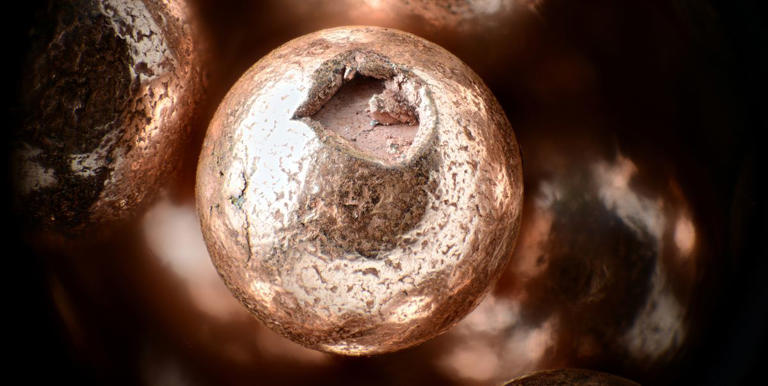Story by Jackie Appel • POP MECH

Scientists found metallic spherules on the ocean floor–and they may be extraterrestrial. A controversial physicist says the strange remnants are alien tech.© J&S Digital Photography - Getty Images
Researchers are looking for evidence of extraterrestrial life deep under the sea.
A team led by controversial physicist Avi Loeb is combing the ocean floor off the coast of Papua New Guinea for remnants of two meteors that they believe could actually be alien tech.
The government of Papua New Guinea claims that the artifacts recovered by Loeb’s team are stollen, and is under pressure to abandon a new security agreement with the U.S. as a result.
Researchers are scouring the deep for signs of alien life—and it might be illegal.
The team—led by Avi Loeb, a controversial theoretical physicist known for his strong belief that we have been visited by intelligent extraterrestrial life and specific focus, in this context, on ‘Oumuamua—has been searching the ocean floor for remnants of Interstellar Meteor 1 (IM1), which crashed into Earth in 2014.
The meteor was a bit of an anomaly, largely due to its robust nature and speed. It and its spiritual successor Interstellar Meteor 2 (IM2), which crashed to Earth in 2017, flew in at about 110,000 miles per hour. That’s at the higher end of meteor speeds, as they typically hit Earth’s atmosphere traveling between 25,000 and 160,000 miles per hour.
That speed is what eventually led Loeb and one of his grad students to conclude that the meteors came from outside our solar system, a conclusion that has since been backed by the United States Space Command, according to Vice. But Loeb and his team took it one step further, putting forth the idea that the meteors are remnants of alien tech.
It should be said that most scientists do not believe that IM1 and IM2 were alien tech of any kind. And it’s important to remember that—while Loeb’s writings indicate that his hopes are high for these finds to be evidence of extraterrestrial societies (He has even reportedly rented out a video screen in Times Square to announce the results of his work.)—the origins of all artifacts found on this mission are still very much unconfirmed.
In order to gather as much data on the meteors as possible, the team has been scraping the sea floor where IM1 splashed down and gather whatever remnants they can find. And most recently, they found something particularly exciting—metallic spherules.
According to Loeb, these particular spherules are made predominantly of iron, with trace amounts of titanium and magnesium. Notably, there was no nickel detected in early compositional analyses. “This composition is anomalous compared to human-made alloys, known asteroids and familiar astrophysical sources,” Loeb wrote in a Medium post. The team has also been able to find steel shards and wire made of manganese and platinum.
While the origin of these specific spherules is still unknown (it takes time and tests to confirm the origin of pretty much anything found at the bottom of the ocean), spherules are a good sign of a meteor. They form from the impact debris of the object, and usually measure only micrometers to millimeters in size.
It turns out, however, that all of this research may not have been legal in the first place.
According to the UK outlet The Times, the government of Papua New Guinea is accusing Loeb’s team of stealing the artifacts they have collected on their mission. The country’s National Research Agency claimed that the team never received a Marine Science Research permit (though they did apply for one), and that they entered the country on business visas instead of visas meant for scientific researchers. Stanis Hulahau, Papua New Guinea’s chief migration officer, even said that the team could face “criminal charges for removing ‘rare objects’ without notifying the state authorities.”
Rob McCallum, the leader of the expedition (Loeb leads the research team), claims that approval for their mission was given by the Papua New Guinea cabinet, but The Times reports that two cabinet members say they have heard nothing of this approval.
As a result of this mission, pressure is now reportedly being put on the government of Papua New Guinea to abandon a security agreement recently made with the United States. According to The Times, member of parliament and Leader of the Opposition Joseph Lelang called the country to abandon the newly-signed Defense Co-operation Agreement if the US “fail to heed our call and protests”.
“What the US citizens were doing was illegal from the start, including stealing the artifacts from our shores,” Lelang said in a statement. “The ink has not yet dried and already the US citizens are disrespecting our people, our country and constitution.. We expect nothing less than the return of what was stolen from us and for those thieves to be held accountable.”
What will come of these accusations is still to be seen. But even if we don’t have proof of extraterrestrial visitors, we do have proof that pursuing alien life doesn’t make everyday Earth life just go away.
No comments:
Post a Comment